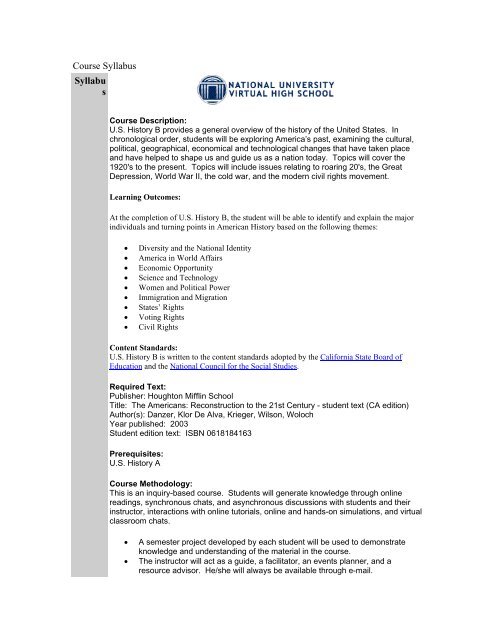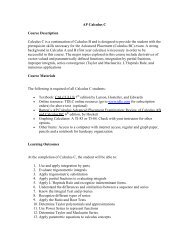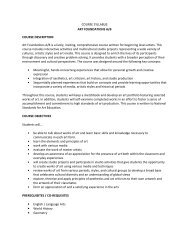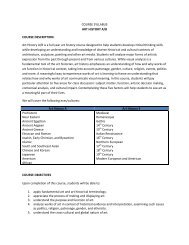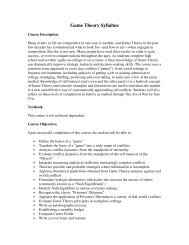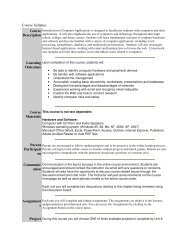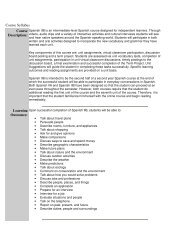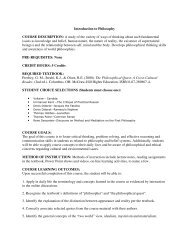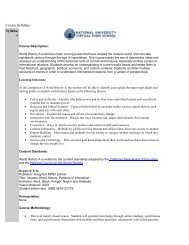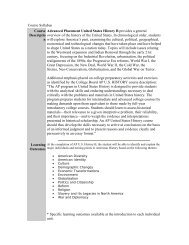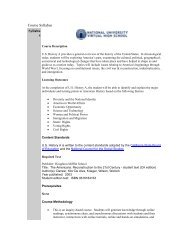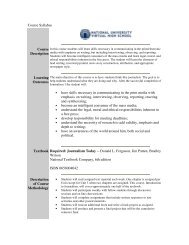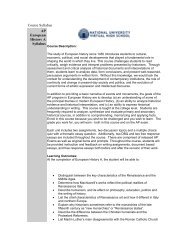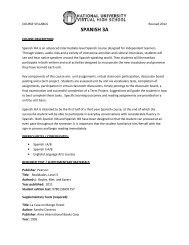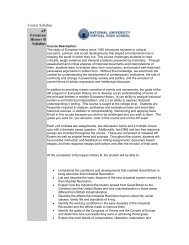US History B Syllabus - National University Virtual High School
US History B Syllabus - National University Virtual High School
US History B Syllabus - National University Virtual High School
Create successful ePaper yourself
Turn your PDF publications into a flip-book with our unique Google optimized e-Paper software.
Course <strong>Syllabus</strong><br />
Syllabu<br />
s<br />
Course Description:<br />
U.S. <strong>History</strong> B provides a general overview of the history of the United States. In<br />
chronological order, students will be exploring America’s past, examining the cultural,<br />
political, geographical, economical and technological changes that have taken place<br />
and have helped to shape us and guide us as a nation today. Topics will cover the<br />
1920's to the present. Topics will include issues relating to roaring 20's, the Great<br />
Depression, World War II, the cold war, and the modern civil rights movement.<br />
Learning Outcomes:<br />
At the completion of U.S. <strong>History</strong> B, the student will be able to identify and explain the major<br />
individuals and turning points in American <strong>History</strong> based on the following themes:<br />
• Diversity and the <strong>National</strong> Identity<br />
• America in World Affairs<br />
• Economic Opportunity<br />
• Science and Technology<br />
• Women and Political Power<br />
• Immigration and Migration<br />
• States’ Rights<br />
• Voting Rights<br />
• Civil Rights<br />
Content Standards:<br />
U.S. <strong>History</strong> B is written to the content standards adopted by the California State Board of<br />
Education and the <strong>National</strong> Council for the Social Studies.<br />
Required Text:<br />
Publisher: Houghton Mifflin <strong>School</strong><br />
Title: The Americans: Reconstruction to the 21st Century - student text (CA edition)<br />
Author(s): Danzer, Klor De Alva, Krieger, Wilson, Woloch<br />
Year published: 2003<br />
Student edition text: ISBN 0618184163<br />
Prerequisites:<br />
U.S. <strong>History</strong> A<br />
Course Methodology:<br />
This is an inquiry-based course. Students will generate knowledge through online<br />
readings, synchronous chats, and asynchronous discussions with students and their<br />
instructor, interactions with online tutorials, online and hands-on simulations, and virtual<br />
classroom chats.<br />
• A semester project developed by each student will be used to demonstrate<br />
knowledge and understanding of the material in the course.<br />
• The instructor will act as a guide, a facilitator, an events planner, and a<br />
resource advisor. He/she will always be available through e-mail.
• The student must actively construct and acquire knowledge by being<br />
intrinsically motivated to succeed. To succeed, students must participate and<br />
complete all readings and activities. This course requires the student’s active<br />
participation.<br />
• Both formal and informal assessment methods will be used in the course.<br />
Informal assessment will include an evaluation of the quality and timeliness of<br />
participation in class activities. Formal assessment may include multiple-choice<br />
quizzes, tests, discussion board participation, and written assignments. A final<br />
exam will be given at the end of the course.<br />
Unit Assignments / Activities<br />
1 Text - selections from:<br />
• Chapter 12 - Politics of the Roaring Twenties<br />
• Chapter 13 - The Roaring Life of the 1920s<br />
Discussion Topics:<br />
• Learning Styles Assessment<br />
• Fascination with Criminals<br />
• Fashion and Fads of the 20s<br />
Activities:<br />
• Are Americans Still "Scared"<br />
• Evolution, Creationism and Education<br />
• Cultural Change in the 1920s<br />
Begin Project<br />
Quiz<br />
2 Text - selections from:<br />
• Chapter 14 - The Great Depression Begins<br />
Discussion Topics:<br />
• Feed Your Family<br />
• Bonus Army Debate<br />
Activities:<br />
• The Stock Market - Good or Bad Investment?<br />
• The Effect of the Great Depression<br />
• Hoover and the Great Depression<br />
Continue Project
Quiz<br />
3 Text - selections from:<br />
• Chapter 15 - The New Deal<br />
Discussion Topics:<br />
• Politicians'' Use of Media<br />
• New Deal: Politics or Humanitarianism?<br />
Activities:<br />
• Evaluate the New Deal<br />
• Three Best New Deal Programs?<br />
• Was the New Deal Anti-Business?<br />
Continue Project<br />
Quiz<br />
4 Text - selections from:<br />
• Chapter 16 - World War Looms<br />
Discussion Topics:<br />
• Evaluating the Emigration Decision<br />
• Holocaust Still Possible Today?<br />
Activities:<br />
• Impact of the Treaty of Versailles<br />
• Leading up to World War II<br />
• Children of the Holocaust<br />
Continue Project<br />
Midterm - Covers Units 1-4<br />
5 Text - selections from:<br />
• Chapter 17 - The United States in World War II<br />
Discussion Topics:<br />
• Japanese Internment<br />
• The Atomic Bomb<br />
Activities:<br />
• World War II Posters<br />
• War Trials
• The Home Front<br />
Continue Project<br />
Quiz<br />
6 Text - selections from:<br />
• Chapter 18 - Cold War Conflicts<br />
Discussion Topics:<br />
• Korean War Worthwhile?<br />
• Cold War Contribution<br />
Activities:<br />
• Origins of the Cold War<br />
• Defending Your Rights<br />
• The Impact of Television<br />
Continue Project<br />
Quiz<br />
7 Text - selections from:<br />
• Chapter 19 - The Postwar Boom<br />
• Chapter 21 - Civil Rights<br />
Discussion Topics:<br />
• The Brown Decision<br />
• What rights are worth fighting for?<br />
Activities:<br />
• The Throwaway Society<br />
• Evaluating the Civil Rights Movement<br />
• Civil Rights in the 1970s and the 1980s<br />
Continue Project<br />
Quiz<br />
8 Text - selections from:<br />
• Chapter 20 - The New Frontier and the Great Society<br />
• Chapter 22 - The Vietnam War Years<br />
Discussion Topics:<br />
• Draft or no Draft?
• Hawk or Dove? Patriotic or Not?<br />
Activities:<br />
• Cuban Missile Crisis<br />
• The Tonkin Resolution<br />
• Vietnam War: Won or Lost?<br />
Submit Final Project<br />
Final Exam - Covers Units 1-8<br />
Assessment:<br />
Type of Assessment<br />
Assignments<br />
Discussion Forums<br />
Quizzes<br />
Exploration Project<br />
Midterm Exam (Unit 4)<br />
Final Exam (Unit 8)<br />
Points<br />
5 points each<br />
5 points each<br />
20 points each<br />
Steps 1-3: 5 points each<br />
Final Project: 100 points<br />
50 points<br />
60 points<br />
Grading Scale:<br />
Letter Grade Percentage Earned<br />
A 90% - 100%<br />
B 80% - 89%<br />
C 70% - 79%<br />
D 60% - 69%<br />
F<br />
59% and lower<br />
Student’s Role and Responsibilities in this Course<br />
Expectations<br />
Students are expected to conduct themselves in a responsible manner that reflects<br />
sound ethics, honor, and good citizenship. It is the student’s responsibility to maintain<br />
academic honesty and integrity and to manifest their commitment to the goals of<br />
NUVHS through their conduct and behavior. Students are expected to abide by all<br />
NUVHS policies and regulations. Any form of academic dishonesty, or inappropriate<br />
conduct by students or applicants may result in penalties ranging from warning to<br />
dismissal, as deemed appropriate by NUVHS.<br />
Communication<br />
Throughout this course students will need to be in close contact with their instructor<br />
and fellow students. Students are expected to communicate via email and electronic<br />
discussion boards. Therefore, students should plan on checking email at least three<br />
times a week and participate in the discussion boards during the weeks they are live.
Instructors strongly encourage and welcome open communication. Clear, consistent,<br />
and proactive communication will ensure a successful experience in this course. It is<br />
the student’s responsibility to notify the instructor immediately if and when a personal<br />
situation occurs that affects his/her performance in this class. Being proactive with<br />
communication will result in a quick solution to any problems that may occur.<br />
Technical Support is offered through Spectrum Pacific Learning Company (SPLC).<br />
Should a student need any technical assistance, he/she should email the Help Desk as<br />
soon as possible at helpdesk@myonlinelogin.com or call 1-877-533-4733. SPLC will<br />
help resolve technical problems and walk through the solution with students. If a<br />
problem persists for more than 48 hours, the student must also notify their teacher and<br />
NUVHS.<br />
Time Required For This Course<br />
To complete this course in eight weeks, students should plan to allocate at least 12-15<br />
hours a week on assigned readings, assignments, discussions (asynchronous and<br />
synchronous), quizzes, and exams. It is highly recommended that students organize<br />
themselves around the course schedule.<br />
NUVHS wishes every student great success in their online class. Please contact us at<br />
1.866.366.8847 if any questions arise.<br />
NUVHS Expected <strong>School</strong>wide Learning Results (ESLRs):<br />
It is anticipated that NUVHS students will be:<br />
Engaged Learners<br />
1. Demonstrate self-directed learning skills such as time management, and<br />
personal responsibility through the completion of course requirements<br />
2. Develop an understanding of their own preferred learning styles to enhance<br />
their overall academic potential<br />
3. Incorporate effective and relevant internet and multimedia resources in their<br />
learning process to broaden their knowledge base<br />
Critical Thinkers<br />
1. Effectively analyze and articulate sound opinions on a variety of complex<br />
concepts<br />
2. Illustrate a variety of problem-solving strategies that strengthen college<br />
preparation and workforce readiness<br />
3. Formulate a framework for applying a variety of technology and internet-based<br />
research to enhance information literacy and collaborative thinking<br />
Effective Communicators<br />
1. Demonstrate awareness and sensitivity to tone and voice in multiple forms of<br />
communication<br />
2. Express concepts and ideas in a variety of forms<br />
3. Enhance communiccation skills through the use of media rich or other<br />
technology resources<br />
Global Citizens<br />
1. Appreciate the value of diversity<br />
2. Understand the range of local and international issues facing today's global<br />
community<br />
3. Demonstrate awareness of the importance of cultural sensitivity and social<br />
responsibility in the 21st century


